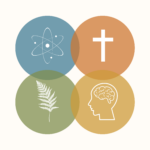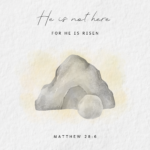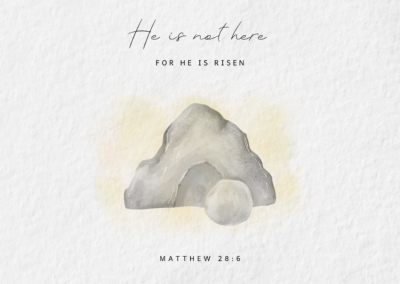
By Dr. Jacob Martin
During this pandemic it is hard to make sense of all of the suffering around the world. Where is God in this pandemic? Is this a judgement from God? How does God allow viruses to kill people? Are viruses evil? I have recently been studying John Walton’s lectures on the book of Job and have discovered that it provides us a blueprint for trusting in God through suffering, instead of trying to pass judgement on the natural world. This trust comes from seeing God as our Creator and Sustainer who suffered for us and is ever present with us.
When trying to answer the question ‘why does suffering occur?’ we very quickly encounter the retribution principle – you are suffering because of what we have done (otherwise known as karma). This is discussed head-on in the book of Job. The challenge is made of Job, a righteous believer, that he is only following God because of his blessed life. So to test this; all of his wealth, his family and his health is taken away.
Job sits in devastation and his friends are present with him. One by one they argue that it is his fault – he must have sinned or he might be being punished for future sins. Or perhaps he is being taught a lesson by God to build his character.
If you have been in church you may be familiar with this sort of language. Perhaps if you’ve been ill or suffered another way, you have been told that you did not pray enough or you do not have enough faith or perhaps you are being punished for a previous sin. These suggestions are hardly ever true and are almost always hurtful and they are not how we see Jesus responding to people suffering.
Job also points out that often wicked people go unpunished so it appears more complicated than simply good people don’t suffer and bad people do. Job complains about how violent people seem to go about their lives and are not punished. How come evil people seem to prosper? In Job is says that:
They thrust the needy off the road;
the poor of the earth all hide themselves.
Job 24:4
We see this everyday in our fallen world. The poor and disenfranchised, being pushed into the gutter.
Job then asks for an answer from God – why are you doing this to me?
So let’s see how God responds to Job’s request for answers. He comes in a whirlwind, saying:
Where were you when I laid the foundation of the earth?
Job 38:4
What follows is one of the most beautiful and terrifying descriptions of the natural world, describing not only the grand scale of this world but also how little we really understand it. Or even if we could understand it (through science, for example) how little power we have to influence it. At one point God says to Job,
Can you bind the chains of the Pleiades,
or loose the cords of Orion?
Can you lead forth the Mazzaroth in their season,
or can you guide the Bear with its children?
Do you know the ordinances of the heavens?
Can you establish their rule on the earth?
Psalm 38:31-33
These verses refer to the constellations. Basically, God is saying can you make the stars and establish how they move?
Most importantly, God does not give Job an answer to why this universe has pain and suffering and viruses and violence. But God does say that God knows all and that we should trust.
As a scientist and a Christian, I’m interested in what the presence of viruses says about God and our natural world. Some of the most recent scientific research on viruses has shown me that God is much bigger than I could imagine, and has changed the way I think about viruses and whether or not we can consider them to be evil. From modern genetics we can work out that viruses and virus-like elements are integrated directly into our DNA, making up 8% of our genome (LTR elements, which include genuine retroviruses). This happens when a virus infects a reproductive cell that goes on to produce an offspring. In some cases this may cause disease but in rare cases the creature is able to make use of some of the viral machinery (the huge majority of inserted viral DNA are deactivated).
A most remarkable example is seen in a recent understanding of the placenta. This is an organ that allows nutrients to follows from the mother’s blood to the baby’s. Marsupials are animals that have primitive placentas; they are leaky and the mother’s blood mixes with the baby’s blood. This can lead to an immune response from the mother if the baby is attached for too long. For marsupials this is overcome by detaching the fetus early on in pregnancy and a pouch is used to incubate the baby until it is large enough to leave. It turns out that many mammals have a virus inserted into the part of the genome that makes the placenta. One of these viral machines is manufactured in mammal fetal cells ending up on the surface of the placental cells. This protein originally allowed the virus to stick to the cell, to infect it, but in such mammals it allows the fetal cells lining the placenta to stick to one another forming a seal that does not allow the mother’s blood to intermingle with the baby’s. It also suppresses the mother’s immune system allowing a fetus to develop fully inside the mother. This piece of viral DNA is critical in many mammals including humans. Take it out and such mammals are unable to carry children. It is not an overstatement to say that we rely on viral DNA to survive (for more on this topic see Graeme Finlay’s “The Amazing Placenta: Evolution and a Lifeline to Humanness,” coming out in this month’s edition of the Zygon journal).
I want to be clear that I am not saying viruses are good. Natural phenomena are capable of both harmful and beneficial results. The COVID-19 outbreak reveals the great harm. The global death of many thousands of people grieves God greatly. We know that God never minimizes our suffering. Even when Jesus was about to bring Lazarus back to life, he mourned him first. God entered into history and suffered with us. God the Father watched as his son was cruelly killed on a cross. Today God is always present with us in our suffering through the Holy Spirit and God’s people. It is critical for the church to mourn and be present with all those who suffer.
However, the fact that our bodies rely on viral DNA to function points to the complexity of this world and that God alone is in a position to judge and guide history.
But God is not some old man sitting in a cloud; God is intimately present with us in our creation and our suffering. In Psalm 139 it says:
“For it was you who formed my inward parts;
you knit me together in my mother’s womb.”
Psalm 139:13
God used something that many would consider for evil and used it for good in this case.
The book of Job is powerful because God calls us to trust by revealing the majestic creation to us and by being present with us. We are unable to fully understand why bad things happen, but all discussion of theodicy (why there is suffering) should always bring us back to theology (knowing more and trusting in God).
God sees you in your suffering, God mourns with you and God is present with you.
Let’s pray, as Job did many years ago:
“For I know that my Redeemer lives,
and that at the last he will stand upon the earth;
and after my skin has been thus destroyed,
then in my flesh I shall see God,
Job 19:25
For more information on Job see John Walton’s lectures on the book of Job and more information on the placenta see Graeme Finlay’s recent paper in Zygon. NRSV bible translation used throughout.
More Blog Posts
- Unified Knowledge: A Conversation on Faith, Science & the Barriers BetweenDr. Nicola Hoggard Creegan reflects with Rev. A/Prof. Doru Costache on an upcoming essay exploring why science and theology struggle to connect. From Karl Barth’s influence to cultural resistance in both church and science, she calls for a more integrated pursuit of truth.
- A New Copernican Turn: Contemporary Cosmology, The Self and Orthodox Science-Engaged TheologyThis book review of A New Copernican Turn highlights a compelling blend of cosmology, theology, contemplation, and consciousness, urging Christians to engage deeply with science and the natural world.
- Going beyond the bitter river with Sarah Anne Beattie, From Eden to Interstellar SpaceThis book review celebrates Sarah Beattie’s From Eden to Interstellar Space, a profound exploration that blends faith, science, and cosmic wonder.
- A Reflection on Easter in Light of ScienceWhat if the mystery of Easter—the death and resurrection of Christ—invites us into a mystery as profound as the universe itself?
- Mental Health and Faith: The Struggle for Soul, Identity, and FlourishingISCAST–NZCIS Conversations 2025, in collaboration with the Centre for Theology and Psychology at Melbourne School of Theology.
- Mind, God & SpiritMarch 22nd, 2025 | Experiencing Spirit in relationships, in the ‘ordinary and banal,’ and in ‘thin spaces’:









